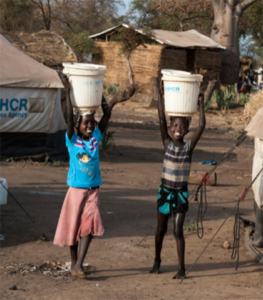Refugee girls leading in the fight against COVID-19
Refugee girls and women are leading efforts to stop the spread of the COVID-19 virus in camps, according to a report by the UN’s refugee agency.
And they play a vital role in displaced populations’ ability to not only survive, but to thrive by collecting clean water for their families and communities, the UNHCR report says.
 “For many, this means long daily travels to gather water from far away wells and safe water sources. The journeys they take each day may consume many hours, but the importance of their work cannot be stressed enough,” the report says.
“For many, this means long daily travels to gather water from far away wells and safe water sources. The journeys they take each day may consume many hours, but the importance of their work cannot be stressed enough,” the report says.
The water collected is used for cooking, drinking, cleaning and maintaining good hygiene.
During times of crisis and outbreaks of disease, this water can mean the difference between health and illness for thousands of people, the report says.
It says women in refugee camps are also taking on leadership roles to stop the spread of coronavirus.
Many have been trained by UNHCR and aid agencies as water a sanitation volunteers and leading classes on best practices for good hygiene and spreading the message that people must wash their hands and cover their mouths when they sneeze in order to stay safe and prevent an outbreak of coronavirus in their community.
The report says many refugees have been exposed to extreme trauma watching their loved ones be killed, seeing their homes destroyed, running for their lives and arriving in new unfamiliar places.
“Post-traumatic stress disorder (PTSD) and other mental health conditions can be hard to treat in any circumstance, but in settings where healthcare is limited, mental health care often goes unaddressed,” the report says.
“UNHCR recognises the importance of mental health care and prioritises it when treating refugees and other displaced populations,” it says.
“In refugee communities around the world, women are being taught that there is no shame in asking for help and that their mental health is an important part of their overall wellbeing.
“Group therapy sessions for refugee women, like those provided for rape victims in Bangladesh, help them realize that they are not alone in their struggles. By lifting one another up, these women become healthier and stronger,” the reports says.
It says many children living in conflict zones and unsafe regions do not have access to education – their schools have been destroyed and they have been forced to stay home.
“Refugee girls are at an even higher risk of missing out on educational opportunities. But these little girls are making education their number one priority,” the report says.
“They go to school in refugee camps and host communities and work hard to be at the top of their classes.”












